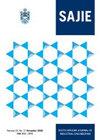PRIORITISING THE PRACTICES THAT INFLUENCE THE OPERATIONAL PERFORMANCE OF MANUFACTURING ORGANISATIONS USING HYBRID AHP-TOPSIS ANALYSIS
IF 0.5
4区 工程技术
Q4 ENGINEERING, INDUSTRIAL
引用次数: 6
Abstract
Organisations cannot put their efforts equally into all the best practices that impact operational performance, due to their limited resources, their ineffective usage, government policies, and inadequate strategic planning. In this contribution, we aim to identify and prioritise the practices with the most impact on operational performance. Twelve practices that steer operational performance were identified through a literature survey. Second, the identified practices were prioritised and evaluated, based on improving operational performance by using a hybrid approach. The analytical hierarchy process (AHP) and the technique for order performance by similarity to ideal solution (TOPSIS) method were used such that AHP was applied to determine the relative weights of alternatives, and then the final ranking was obtained by conducting a TOPSIS analysis. Empirical data were collected from eight experts and 417 users at operational-level. The results suggest that lean management, total quality management, six sigma, and supply chain management practices rank 1st, 2nd, 3rd, and 4th respectively, signifying the practices with the most influence and making the greatest contribution. This strategic understanding will help researchers and practitioners to frame competitive strategies in order to pay more attention to those practices that have a greater influence on operational performance.使用混合AHP-TOPSIS分析对影响制造组织运营绩效的实践进行优先排序
由于资源有限、使用效率低下、政府政策和战略规划不足,组织无法平等地将精力投入到影响运营绩效的所有最佳实践中。在这一贡献中,我们的目标是确定并优先考虑对运营绩效影响最大的做法。通过文献调查,确定了12种指导运营绩效的做法。其次,在使用混合方法提高运营绩效的基础上,对已确定的做法进行了优先排序和评估。采用层次分析法(AHP)和TOPSIS排序法(TOPSIS法)确定备选方案的相对权重,然后通过TOPSIS分析获得最终排名。从8名专家和417名业务用户那里收集了经验数据。结果表明,精益管理、全面质量管理、六西格玛和供应链管理实践分别排名第一、第二、第三和第四,表明这些实践影响最大、贡献最大。这种战略理解将有助于研究人员和从业者制定竞争战略,以便更多地关注那些对运营绩效有更大影响的实践。
本文章由计算机程序翻译,如有差异,请以英文原文为准。
求助全文
约1分钟内获得全文
求助全文
来源期刊
CiteScore
1.10
自引率
20.00%
发文量
15
审稿时长
6 weeks
期刊介绍:
The South African Journal of Industrial Engineering (SAJIE) publishes articles with the emphasis on research, development and application within the fields of Industrial Engineering and Engineering and Technology Management. In this way, it aims to contribute to the further development of these fields of study and to serve as a vehicle for the effective interchange of knowledge, ideas and experience between the research and training oriented institutions and the application oriented industry. Articles on practical applications, original research and meaningful new developments as well as state of the art surveys are encouraged.

 求助内容:
求助内容: 应助结果提醒方式:
应助结果提醒方式:


